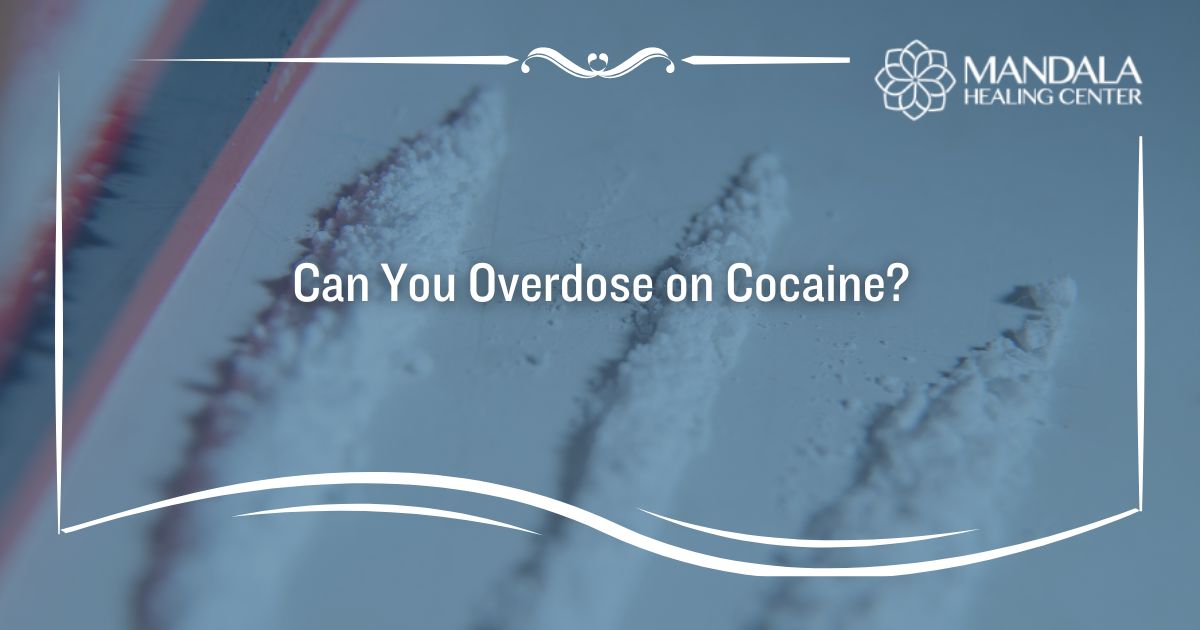Cocaine is a central nervous system stimulant that can lead to an energized and euphoric high. While it does have medicinal uses, it is considered to have a high potential for abuse and addiction. According to the U.S. Department of Justice, 27,788,000 people have abused cocaine at some point in their lifetime.[1]
The more often you use cocaine, the more likely it is that you will develop an addiction. Additionally, cocaine causes a short-lived high, which means most people binge on the drug. Binging on cocaine increases the risk of experiencing a life-threatening overdose.
Cocaine overdoses can lead to symptoms like increased body temperature, high blood pressure, erratic heart rate, seizures, strokes, or heart attacks. Mixing cocaine with other substances like drugs or alcohol can make you more likely to experience an overdose.
If you or a loved one suffers from cocaine abuse or has experienced a cocaine overdose in the past, you should consider attending a cocaine addiction treatment center. Programs like the Mandala Healing Center offer a combination of medical detox, evidence-based therapies, and relapse prevention planning to help you achieve long-term recovery.
In this article, you will learn:
- What are the effects of cocaine?
- What causes a cocaine overdose?
- What are the symptoms of cocaine overdoses?
What are the Effects of Cocaine?
Cocaine is a stimulant drug, which means it increases activity in your brain and body. If you have heard of cocaine before, you know it causes increased energy. There are other effects of cocaine to be aware of.
The effects of cocaine include:[2]
- A rush of euphoria
- Increased energy
- Talkativeness and increased self-confidence
- Mental alertness and increased focus
- Decreased need for food and sleep
- Dilated pupils
- Increased body temperature and excessive sweating
- Fast or irregular heartbeat
- High blood pressure
- Vertigo and muscle twitches
- Strange, erratic, or violent behavior
- Paranoia and psychosis
Even using cocaine once can lead to dangerous and life-threatening symptoms. According to the National Institute on Drug Abuse (NIDA), cocaine use can lead to “cardiovascular system effects, including disturbances in heart rhythm and heart attacks; neurological effects, including headaches, seizures, strokes, and coma; and gastrointestinal complications, including abdominal pain and nausea.”[3]
What Causes a Cocaine Overdose?
Cocaine overdoses are caused by consuming too much cocaine at once. There is not a specific dose of cocaine that leads to an overdose, as things like body weight, drug tolerance, and brain chemistry can play a role in how sensitive you are to drugs.
That being said, some risk factors can increase your likelihood of experiencing an overdose when you abuse cocaine. First, binging on the substance is the easiest way to experience cocaine toxicity. Repeated doses of cocaine in short periods will eventually cause an overdose.
Another thing to consider is whether you are mixing cocaine with other drugs. Taking alcohol or another substance like opioids, benzodiazepines, or stimulants while you are already high on cocaine could cause you to experience life-threatening effects.
Lastly, sometimes cocaine is contaminated with other drugs like fentanyl. If you ingest fentanyl-laced cocaine, you are likely to experience a fentanyl overdose. According to research in Florida, “2,499 of the 2,882 statewide cocaine deaths involved cocaine in combination with other drugs.”[4]
Cocaine Overdose Symptoms
If you or a loved one abuse cocaine, it’s important to be aware of the signs and symptoms of a cocaine overdose. Being able to recognize the signs could allow you to save your loved one’s life.
Cocaine overdoses can occur in stages. The first stage of a cocaine overdose includes:[5]
- Elevated blood pressure
- Increased heart rate
- Rapid breathing
- Mental health symptoms like paranoia, confusion, or delusional thinking
The next stage of cocaine overdose could involve the following symptoms:[5]
- Increased body temperature
- Elevated heart rate and blood pressure
- Loss of bladder control
- Seizures
- Breathing problems
During the final and most serious stage of cocaine overdose, you might experience:[5]
- Respiratory failure
- Cardiac arrest
- Loss of vital functions
If you notice any of the symptoms of cocaine overdose, you should contact 911 immediately. Without medical intervention, the symptoms could progress into an overdose death.
After you or your loved one is treated for a cocaine overdose, you should consider attending a professional drug rehab program. Experiencing an overdose is a clear sign that you are suffering from a substance use disorder that requires long-term treatment.
Find Help for Cocaine Abuse and Addiction
If you or a loved one struggles with cocaine addiction, it’s time to seek help. At the Mandala Healing Center, we offer a combination of compassionate, evidence-based, and individualized treatment.
Why Choose The Mandala Healing Center? Clients are taken on a journey of healing through complete immersion into evidence-based clinical modalities, multifaceted alternative therapies, and expert medical management, allowing them to fully detox and recover from drug and alcohol addictions. Through a program of care designed to encourage change, a foundation is created that allows clients to find their higher purpose and reclaim their lives.
Attending rehab for cocaine addiction can prevent you from experiencing life-threatening overdoses and long-term health concerns. Contact us today to learn more about our cocaine addiction treatment center.
References:
- The U.S. Department of Justice: Powdered Cocaine Fast Facts
- Medline Plus: Cocaine
- The National Institute on Drug Abuse (NIDA): Cocaine
- The Drug Enforcement Administration (DEA): Deadly Contaminated Cocaine Widespread in Florida
- Medscape: Cocaine Toxicity
















